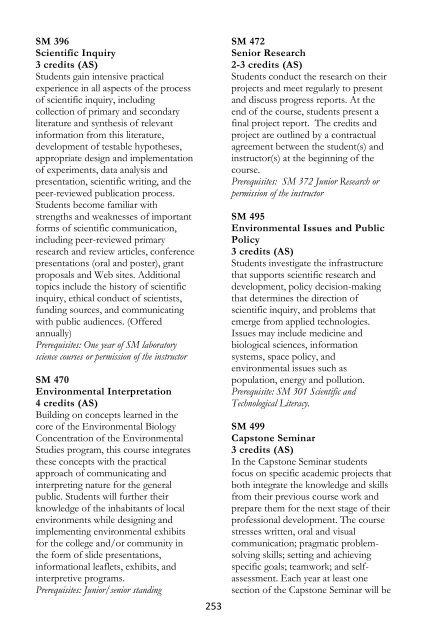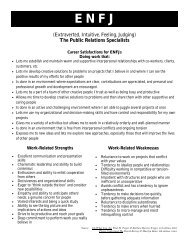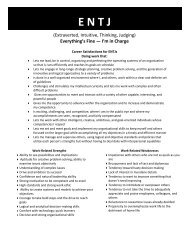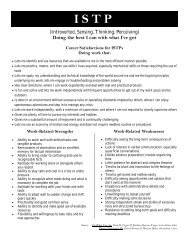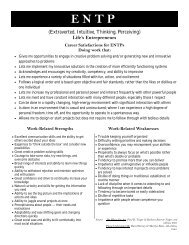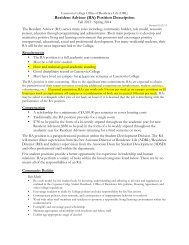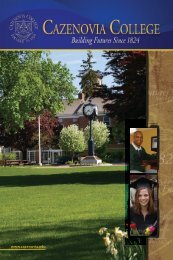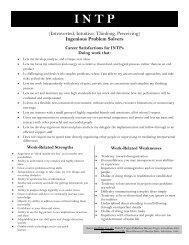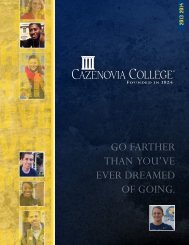Named one of “America’s Best Colleges” by U.S News & World Report
2011-12 Academic Catalog - Cazenovia College
2011-12 Academic Catalog - Cazenovia College
- No tags were found...
Create successful ePaper yourself
Turn your PDF publications into a flip-book with our unique Google optimized e-Paper software.
SM 396<br />
Scientific Inquiry<br />
3 credits (AS)<br />
Students gain intensive practical<br />
experience in all aspects <strong>of</strong> the process<br />
<strong>of</strong> scientific inquiry, including<br />
collection <strong>of</strong> primary and secondary<br />
literature and synthesis <strong>of</strong> relevant<br />
information from this literature,<br />
development <strong>of</strong> testable hypotheses,<br />
appropriate design and implementation<br />
<strong>of</strong> experiments, data analysis and<br />
presentation, scientific writing, and the<br />
peer-reviewed publication process.<br />
Students become familiar with<br />
strengths and weaknesses <strong>of</strong> important<br />
forms <strong>of</strong> scientific communication,<br />
including peer-reviewed primary<br />
research and review articles, conference<br />
presentations (oral and poster), grant<br />
proposals and Web sites. Additional<br />
topics include the history <strong>of</strong> scientific<br />
inquiry, ethical conduct <strong>of</strong> scientists,<br />
funding sources, and communicating<br />
with public audiences. (Offered<br />
annually)<br />
Prerequisites: One year <strong>of</strong> SM laboratory<br />
science courses or permission <strong>of</strong> the instructor<br />
SM 470<br />
Environmental Interpretation<br />
4 credits (AS)<br />
Building on concepts learned in the<br />
core <strong>of</strong> the Environmental Biology<br />
Concentration <strong>of</strong> the Environmental<br />
Studies program, this course integrates<br />
these concepts with the practical<br />
approach <strong>of</strong> communicating and<br />
interpreting nature for the general<br />
public. Students will further their<br />
knowledge <strong>of</strong> the inhabitants <strong>of</strong> local<br />
environments while designing and<br />
implementing environmental exhibits<br />
for the college and/or community in<br />
the form <strong>of</strong> slide presentations,<br />
informational leaflets, exhibits, and<br />
interpretive programs.<br />
Prerequisites: Junior/senior standing<br />
253<br />
SM 472<br />
Senior Research<br />
2-3 credits (AS)<br />
Students conduct the research on their<br />
projects and meet regularly to present<br />
and discuss progress reports. At the<br />
end <strong>of</strong> the course, students present a<br />
final project report. The credits and<br />
project are outlined <strong>by</strong> a contractual<br />
agreement between the student(s) and<br />
instructor(s) at the beginning <strong>of</strong> the<br />
course.<br />
Prerequisites: SM 372 Junior Research or<br />
permission <strong>of</strong> the instructor<br />
SM 495<br />
Environmental Issues and Public<br />
Policy<br />
3 credits (AS)<br />
Students investigate the infrastructure<br />
that supports scientific research and<br />
development, policy decision-making<br />
that determines the direction <strong>of</strong><br />
scientific inquiry, and problems that<br />
emerge from applied technologies.<br />
Issues may include medicine and<br />
biological sciences, information<br />
systems, space policy, and<br />
environmental issues such as<br />
population, energy and pollution.<br />
Prerequisite: SM 301 Scientific and<br />
Technological Literacy.<br />
SM 499<br />
Capst<strong>one</strong> Seminar<br />
3 credits (AS)<br />
In the Capst<strong>one</strong> Seminar students<br />
focus on specific academic projects that<br />
both integrate the knowledge and skills<br />
from their previous course work and<br />
prepare them for the next stage <strong>of</strong> their<br />
pr<strong>of</strong>essional development. The course<br />
stresses written, oral and visual<br />
communication; pragmatic problemsolving<br />
skills; setting and achieving<br />
specific goals; teamwork; and selfassessment.<br />
Each year at least <strong>one</strong><br />
section <strong>of</strong> the Capst<strong>one</strong> Seminar will be


